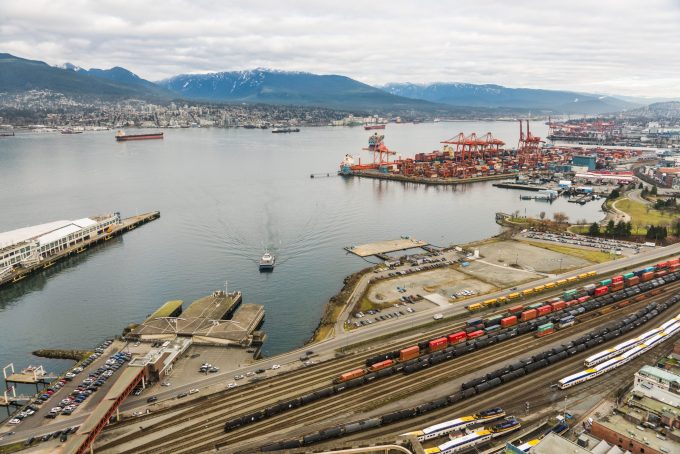News in Brief podcast | Week 30 2024 | Surcharges, strikes and IATA's stressful settlements
In this episode of The Loadstar’s News in Brief Podcast, host and news reporter Charlotte Goldstone ...
TFII: SOLID AS USUALMAERSK: WEAKENINGF: FALLING OFF A CLIFFAAPL: 'BOTTLENECK IN MAINLAND CHINA'AAPL: CHINA TRENDSDHL: GROWTH CAPEXR: ANOTHER SOLID DELIVERYMFT: HERE COMES THE FALLDSV: LOOK AT SCHENKER PERFORMANCEUPS: A WAVE OF DOWNGRADES DSV: BARGAIN BINKNX: EARNINGS OUTODFL: RISING AND FALLING AND THEN RISING
TFII: SOLID AS USUALMAERSK: WEAKENINGF: FALLING OFF A CLIFFAAPL: 'BOTTLENECK IN MAINLAND CHINA'AAPL: CHINA TRENDSDHL: GROWTH CAPEXR: ANOTHER SOLID DELIVERYMFT: HERE COMES THE FALLDSV: LOOK AT SCHENKER PERFORMANCEUPS: A WAVE OF DOWNGRADES DSV: BARGAIN BINKNX: EARNINGS OUTODFL: RISING AND FALLING AND THEN RISING

Supply chain planning involving the North American west coast is getting more challenging, as cargo owners now have to add the spectre of shutdowns at Canadian gateways to work stoppages at US ports.
Members of the International Longshore and Warehouse Union (ILWU) Canada will vote today and tomorrow on whether to authorise strike action amid contract negotiations with the British Columbia Maritime Employers Association (BCMEA).
Work stoppages at the ports of Vancouver and Prince Rupert could happen as early as 24 June.
From their start in early March, the negotiations between union and employers have rapidly moved towards confrontation.
The previous round of contract negotiations, five years, ago dragged on for 18 months, but the union, however, has opted for a brisker pace this year. After five sessions, two weeks into the discussions, the ILWU decided that no meaningful progress had been made and called for mediation from the federal government.
Ottawa did not hesitate and promptly appointed two mediators to join the talks, a process which ended on 31 May.
Neither side has released details of the negotiations, but the mediators’ departure set the clock ticking on a 21-day ‘cooling-off’ period. The ILWU and BCMEA agreed on a 72-hour notice period before action can be taken, which makes 24 June the earliest possible start of a work stoppage.
Some bargaining sessions are scheduled for this month, but the union’s call for a vote on strike action suggests its leadership has little hope for significant progress and remains bent on a rapid course to press its agenda.
Neither side has commented on the current state of negotiations. The BCMEA, which represents 49 employers at 30 ports across British Columbia, said on its website it would continue to negotiate to reach “a fair and balanced deal”.
Before negotiations began, the ILWU indicated it was seeking “substantial wage increases” for its 7,000-plus members at ports in BC, but another flashpoint is automation, an issue that came to the fore in discussions earlier this year on plans for a fourth container terminal at Vancouver.
The port authority maintained that the decision about automation would rest with the operator of the new facility, while the ILWU expressed concern that a strong push for automation would have a knock-on effect on the port’s other facilities, forcing them to follow suit.
Automation has also been a contentious issue as ILWU-PMA negotiations south of the border, which began last summer, drag on.
In addition to causing headaches for Canadian importers and shippers, work stoppages at Vancouver and Prince Rupert would have serious repercussions for US businesses. Intermodal volumes headed to the US, notably the midwest, make up a substantial portion of the ports’ container imports.
It also raises the spectre of paralysis of traffic flows along the coast from British Columbia to California, and is the first time contract negotiations are threatening disruption on both sides of the Canada-US border.
Some observers have commented that this scenario will likely accelerate the migration of traffic from the west coast to other gateways. Recently US cargo owners have begun to shift some of their traffic that was diverted to ports on the east and Gulf coasts back to the west, due to lower rates and unobstructed flows through western gateways.
Recent developments in the labour arena are not likely to foster confidence that flows through west coast ports will be smooth.
Comment on this article